Hole in the Clouds
Jun 19, 2010


Two subtle murals on rowhouse endwalls at 22nd and Walnut streets in Philadelphia recover in shadow and reflection a long-gone church that once occupied the site that is now is a gas station.
Artist Michael Webb painted every brick on the two murals, which adorn plain stucco walls that had long been covered with graffiti. St. James Church dated back to 1870, which is the era rendered in the murals' architectural details.
Sunoco commissioned the murals in 1999, hoping to put an end to the gas station's graffiti problems. The plan worked.
cityscape
Philadelphia
Michael Webb
trompe l'oeil
mural
Aug 4, 2011
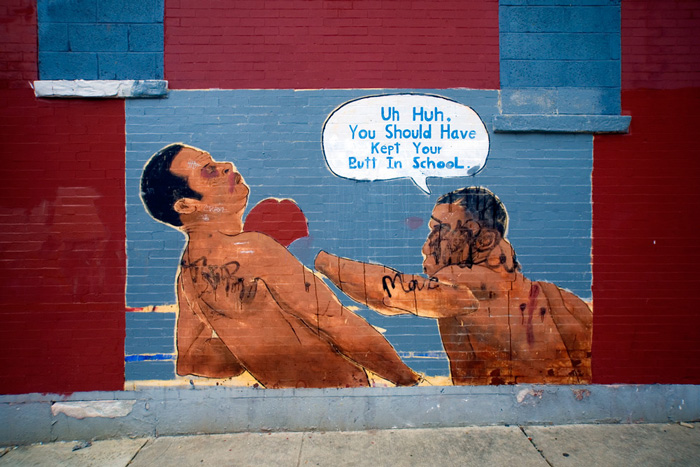 North Philly mural.
North Philly mural.
mural
North Philadelphia
boxing
comic book
(Image credit: Bradley Maule)
Sep 10, 2011
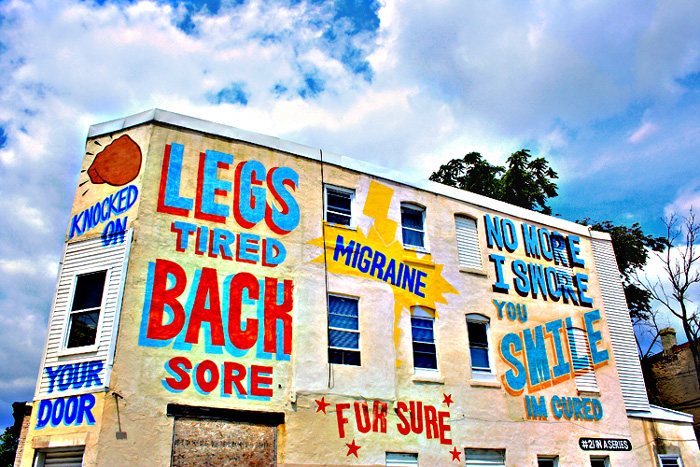 One of the Love Murals on Market Street in West Philly.
One of the Love Murals on Market Street in West Philly.
Philadelphia
mural
building
West Philly
Market Street
Oct 11, 2011
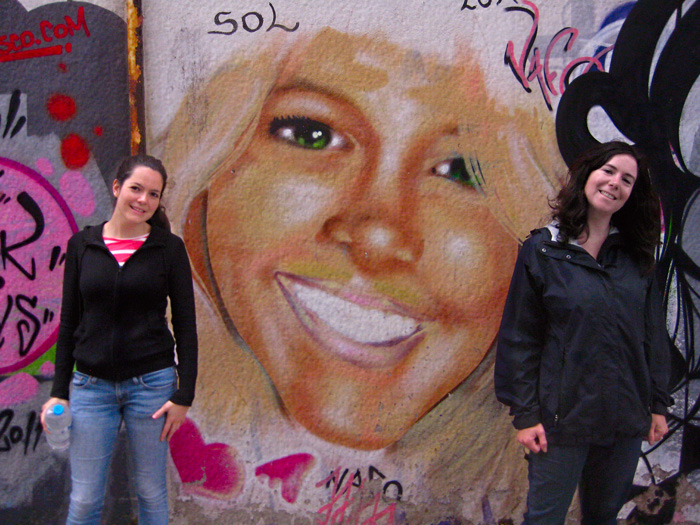 Clearly it was too cold for bathing suits when the sisters Strelitz posed before this mural in Rio de Janeiro, but the smiles were warm and sunny. Caroline, at left, is completing a Fullbright fellowship in Brazil; Bonnie joined her there in August for a mid-winter vacation.
Clearly it was too cold for bathing suits when the sisters Strelitz posed before this mural in Rio de Janeiro, but the smiles were warm and sunny. Caroline, at left, is completing a Fullbright fellowship in Brazil; Bonnie joined her there in August for a mid-winter vacation.
mural
Bonnie
Caroline
Brazil
Rio de Janeiro
(Image credit: JJ Stein)
Dec 31, 2011
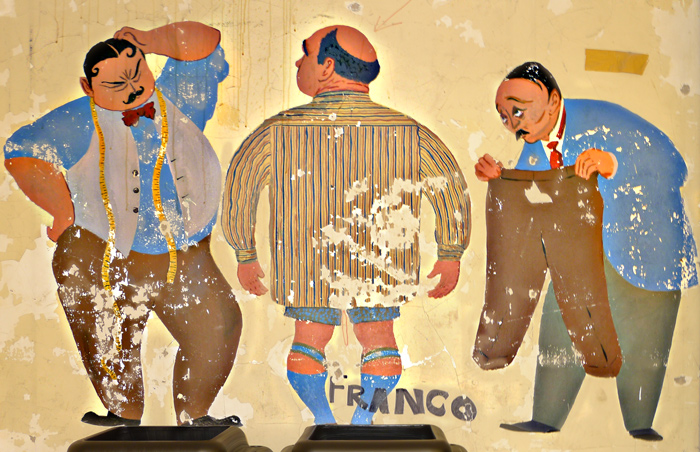 One of about a dozen murals painted in 1938 by Joseph Hirsch to decorate the basement walls of a long-since-abandoned building on South Street in Philadelphia, this one is titled "A Mechanical Engineering Problem." I can't say I know for certain what the joke is here, though the fact that the art had been commissioned by the Amalgamated Clothing Workers of America (ACWA), who owned the building and used it for an office and social center, would have to be a major clue. My guess is that the mustachioed tailors portrayed here were not union workers and were not particularly skilled suitmakers, either; perhaps the point is that only a chump would order a custom-tailored suit from guys like these instead of buying a ready-made, union-made coat and trousers.
One of about a dozen murals painted in 1938 by Joseph Hirsch to decorate the basement walls of a long-since-abandoned building on South Street in Philadelphia, this one is titled "A Mechanical Engineering Problem." I can't say I know for certain what the joke is here, though the fact that the art had been commissioned by the Amalgamated Clothing Workers of America (ACWA), who owned the building and used it for an office and social center, would have to be a major clue. My guess is that the mustachioed tailors portrayed here were not union workers and were not particularly skilled suitmakers, either; perhaps the point is that only a chump would order a custom-tailored suit from guys like these instead of buying a ready-made, union-made coat and trousers.
Here is another take on the same theme:
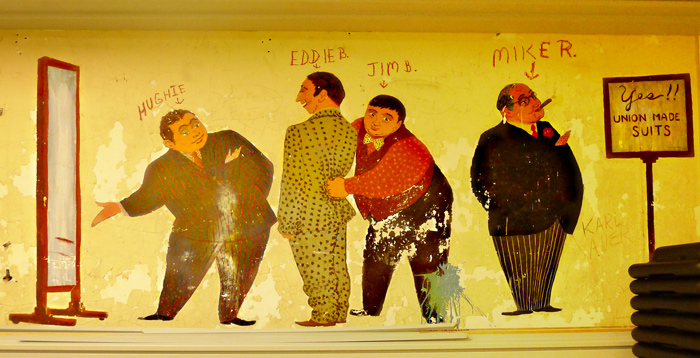 In this image, the chump is getting an ill-fitting suit not because it's off-the-shelf and union-made but because the slimeball salesmen can't or won't be bothered to fit him properly. The superiority of union needlework–which the establishment advertises prominently–is or ought to be a selling point among highfalutin haberdashers.
In this image, the chump is getting an ill-fitting suit not because it's off-the-shelf and union-made but because the slimeball salesmen can't or won't be bothered to fit him properly. The superiority of union needlework–which the establishment advertises prominently–is or ought to be a selling point among highfalutin haberdashers.
Whatever the punch line, the ACWA was happy with the murals and rehired Hirsch a couple of years later to do a much larger and more formal work for the wall of their auditorium upstairs: a mural 11 feet high and 65 feet long–the largest the entire city at the time–which traced the early history of labor unions in the United States. It was later removed from the building and installed in the lobby of the Sidney Hillman Apartments a few blocks away.
Sidney Hillman, who founded the ACWA, had no personal association with Philadelphia; he was born in Lithuania, and after being imprisoned for labor agitation in Poland in the early years of the twentieth century, he settled in Chicago, where he organized several powerful unions and steered the American labor movement toward the Democratic Party in general and Franklin Roosevelt in particular. But his ACWA represented about 25,000 Philadelphians in the 1930s, when locals from around the city got together to buy the building at 2101 South Street, which became known as the Amalgamated Center. There were offices upstairs, an auditorium and meeting rooms on the main floor, and a swimming pool, gym, and social hall in the basement.
The building was already set up for pretty much these same functions and had been since before 1900, when wealthy merchant John Wanamaker financed its construction for the Bethany Brotherhood, a men's fellowship and social lodge from nearby Bethany Presbyterian Church. During World War I, the Brotherhood turned over the building for housing and recrational use by soldiers and sailors on leave; more than 8,000 servicemen swam, played, and partied there in 1917 and 1918, with Wanamaker picking up the tab for operating costs.
The Amalgamated unions bought it in 1934 and remodeled and expanded it, eventually cladding many walls in marble; the ACWA and a series of affiliated and successor unions occupied the building until 1984, when declining membership led to its sale as office space for Graduate Hospital of the University of Pennsylvania.
In recent years, it has sat empty. But this week, the basement and much of the first floor of the old Amalgamated Center reopened to something like its original function: once again, the place is a gym, this time operated by a private company, City Fitness. Old Sidney Hillman would not have approved of how the renovation work was undertaken; a couple of weeks before the reopening, there were pickets in front of the building, in response to a subcontractor's use of non-union labor.
Hirsch's murals in the basement will also meet an inglorious fate (as if the graffiti wasn't enough). They are theoretically protected by the building's inclusion on the National Registry of Historic Places, but what that means in practice is that City Fitness will soon be hiding most of them, covering them over with mirrors for the exercise rooms.
Meanwhile, for a brief moment in a new century, Sidney Hillman, "The Guide and Spirit of Amalgamated C.W.," is once again flying free, even if he does have a heart inked on his bicep with the name Carmine inside:
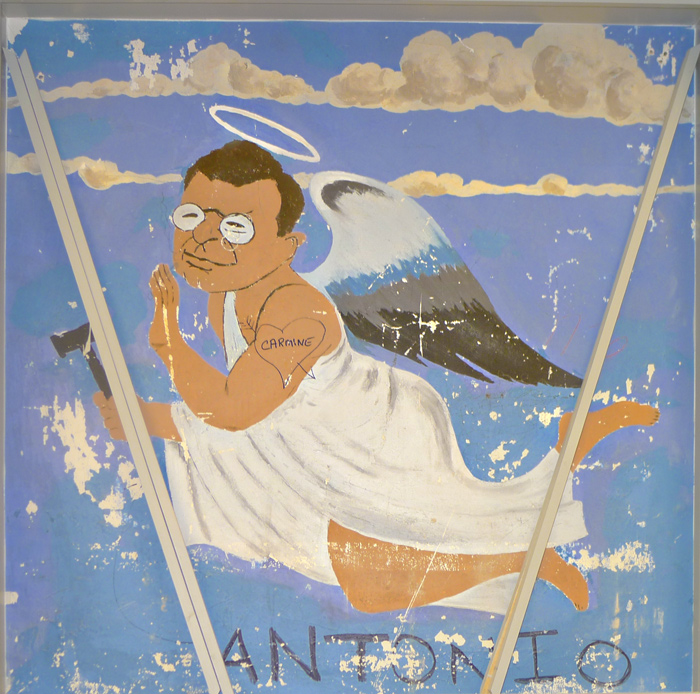
art
Philadelphia
mural
South Street
gym
Sidney Hillman
Amalgamated Clothing Workers of America
labor union
Joseph Hirsch
cartoon
Jan 27, 2012
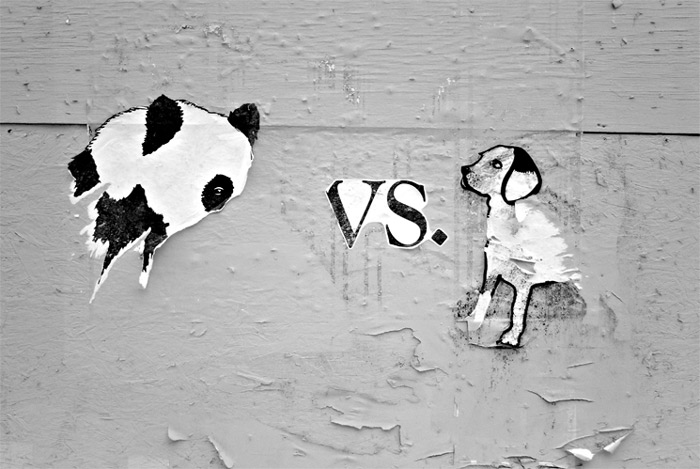 Who would win, the panda or the puppy?
Who would win, the panda or the puppy?
streetscape
mural
urban decay
panda
puppy
(Image credit: Picture Philly)
Jan 31, 2012
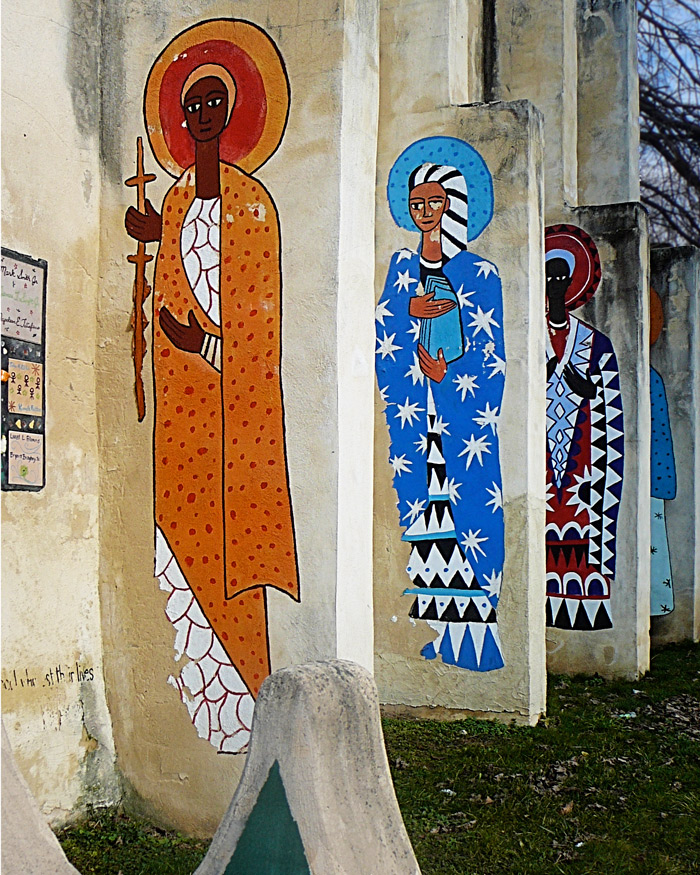 In a garden of sculpture, mosaics, and murals in North Philadelphia, this memorial commemorates the 64 graduates of nearby Edison High School who were killed in Vietnam. According to the writing on the memorial wall, no other public school in America sent more students to die in that war than did Edison.
In a garden of sculpture, mosaics, and murals in North Philadelphia, this memorial commemorates the 64 graduates of nearby Edison High School who were killed in Vietnam. According to the writing on the memorial wall, no other public school in America sent more students to die in that war than did Edison.
garden
mural
public art
North Philly
memorial
Feb 14, 2012
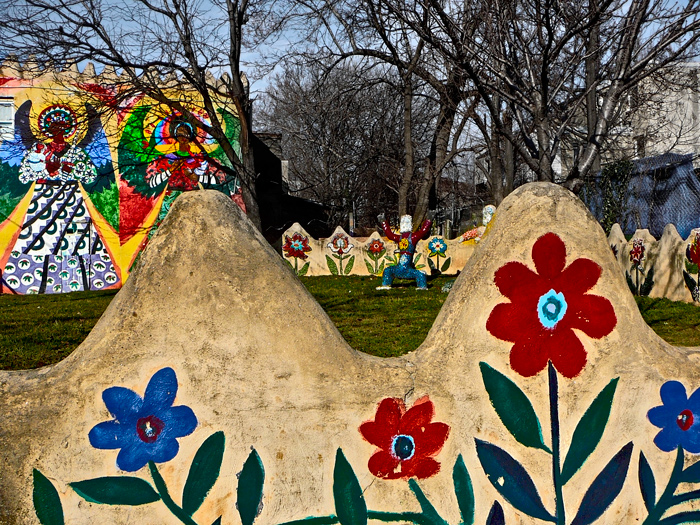 Valentine's Day is all about the stuff that blooms in the garden of life. Or something. Best wishes to all.
Valentine's Day is all about the stuff that blooms in the garden of life. Or something. Best wishes to all.
mural
North Philly
sculpture garden
Apr 20, 2012
 The entire 3800 block of Melon Street, in the Mantua neighborhood of West Philly, got a new coat of paint last summer, thanks to the city's Mural Arts Program and a couple of dozen kids in the neighborhood who apparently are not-so-distant relatives of Tom Sawyer.
The entire 3800 block of Melon Street, in the Mantua neighborhood of West Philly, got a new coat of paint last summer, thanks to the city's Mural Arts Program and a couple of dozen kids in the neighborhood who apparently are not-so-distant relatives of Tom Sawyer.
A new mural isn't going to transform a block, much less a neighborhood. A new coat of paint, even all at once on every house on the block, is unlikely to catalyze dramatic transformation. By all accounts, this was a block and neighborhood that needed a whole lot more than fresh paint. This particular paint job was part of a complex mural-arts project intended to focus attention on the problem of youth homelessness, but that problem, along with Mantua's many other social and economic afflictions, is still very much with us.
Even so, people in fancy neighborhoods aren't the only ones who deserve pleasant surroundings, handsome streetscapes. Melon Street may still be Melon Street, but there's no way this paint job made life there any worse.
streetscape
Philadelphia
mural
West Philly
Melon Street
Mantua
(Image credit: Steve Weinik)
Oct 30, 2012
 Philadelphia rode out the storm without much incident; lots of rain and small tree branches fell, and then that was that. We were the lucky ones this time.
Philadelphia rode out the storm without much incident; lots of rain and small tree branches fell, and then that was that. We were the lucky ones this time.
Although I haven't checked up on it with my own eyes, I'd lay money that this mural on East Passyunk is still standing. The performers celebrated on this wall–in autographed portraits designed by mural artist Peter Pagast to resemble the framed celebrity photos on a restaurant wall–were all born and raised in South Philadelphia: Frankie Avalon, Chubby Checker, Fabian, Bobby Rydell, Al Martino, Eddie Fisher, and in the upper right corner someone not so well known among us ignorant non-Philadelphia natives: disc jockey Jerry Blavat.
In 2005, when the mural was dedicated, all of them except Eddie Fisher showed up for a celebratory sock hop.
music
1950s
mural
South Philly
Italian Market
1960s
Frankie Avalon
Passyunk
Fabian
Bobby Rydell
Jerry Blavat
Al Martino
Chubby Checker
Eddie Fisher
(Image credit: Alex Yu) (Mural Art: Peter Pagast)
Nov 29, 2012
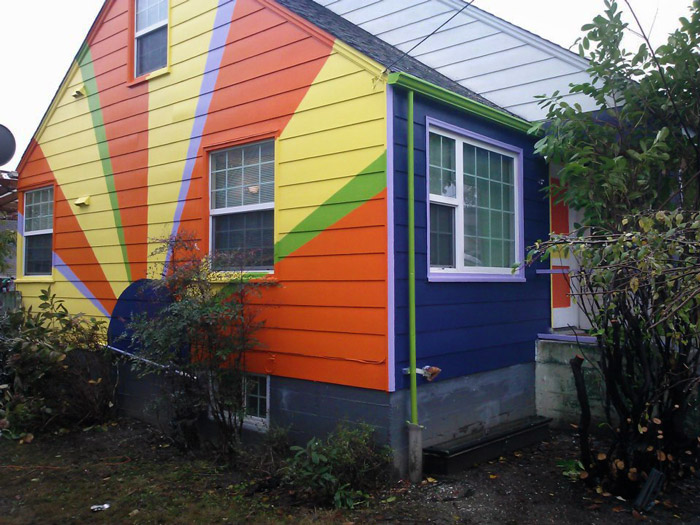 The landlord told the tenants in this little house in Seattle that the place needed painting, and that he and his guys would be taking care of it. And it was true, apparently, that it needed painting, and also true that the landlord and his guys came over recently to do the work.
The landlord told the tenants in this little house in Seattle that the place needed painting, and that he and his guys would be taking care of it. And it was true, apparently, that it needed painting, and also true that the landlord and his guys came over recently to do the work.
The job took two weeks. They painted a sunrise on this side of the house, and a sunset on the other side. Before then, both sides had been plain and gray.
The tenants say they like the house and they like the landlord, and it will take a lot more than this to get them to leave.
Washington
house
mural
Seattle
paint
(Image credit: John Stein)
Sep 17, 2013
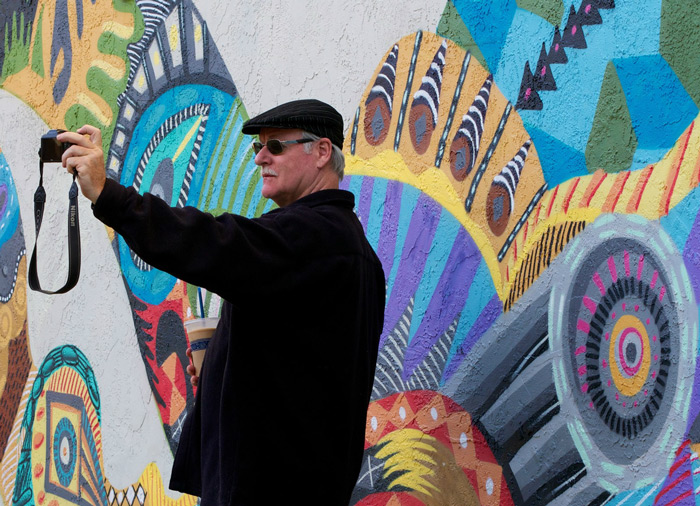
portrait
mural
camera
Oct 5, 2013
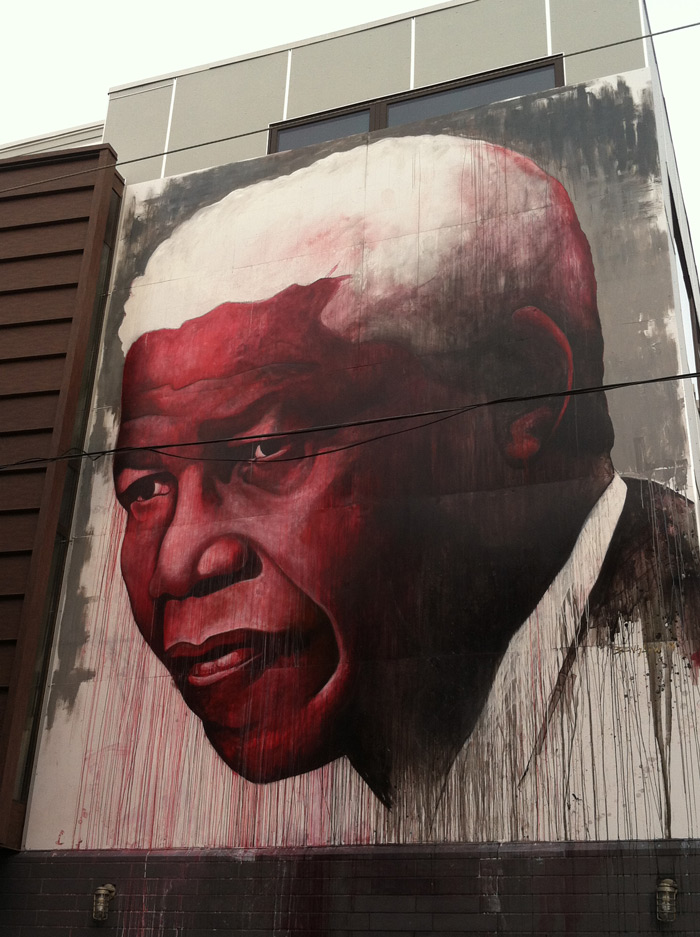 There's a new mural in the neighborhood, bolted high on the wall of a new house at the corner of Fitzwater and Smedley. Looks to be a private project, not part of the city's Mural Arts Program, and it's hard to say if it's intended as permanent street art, since it mostly blocks the windows of the house. But it's something to look at, a portrait of Nelson Mandela looming above a scrim of drippy red and black streaks. The painter signed the mural illegibly; we believe that whoever he or she is, he or she got it right, those dark, worldly, heavy-lidded eyes in a brilliant red face.
There's a new mural in the neighborhood, bolted high on the wall of a new house at the corner of Fitzwater and Smedley. Looks to be a private project, not part of the city's Mural Arts Program, and it's hard to say if it's intended as permanent street art, since it mostly blocks the windows of the house. But it's something to look at, a portrait of Nelson Mandela looming above a scrim of drippy red and black streaks. The painter signed the mural illegibly; we believe that whoever he or she is, he or she got it right, those dark, worldly, heavy-lidded eyes in a brilliant red face.
art
house
streetscape
mural
neighborhood
Nelson Mandela
Oct 8, 2013
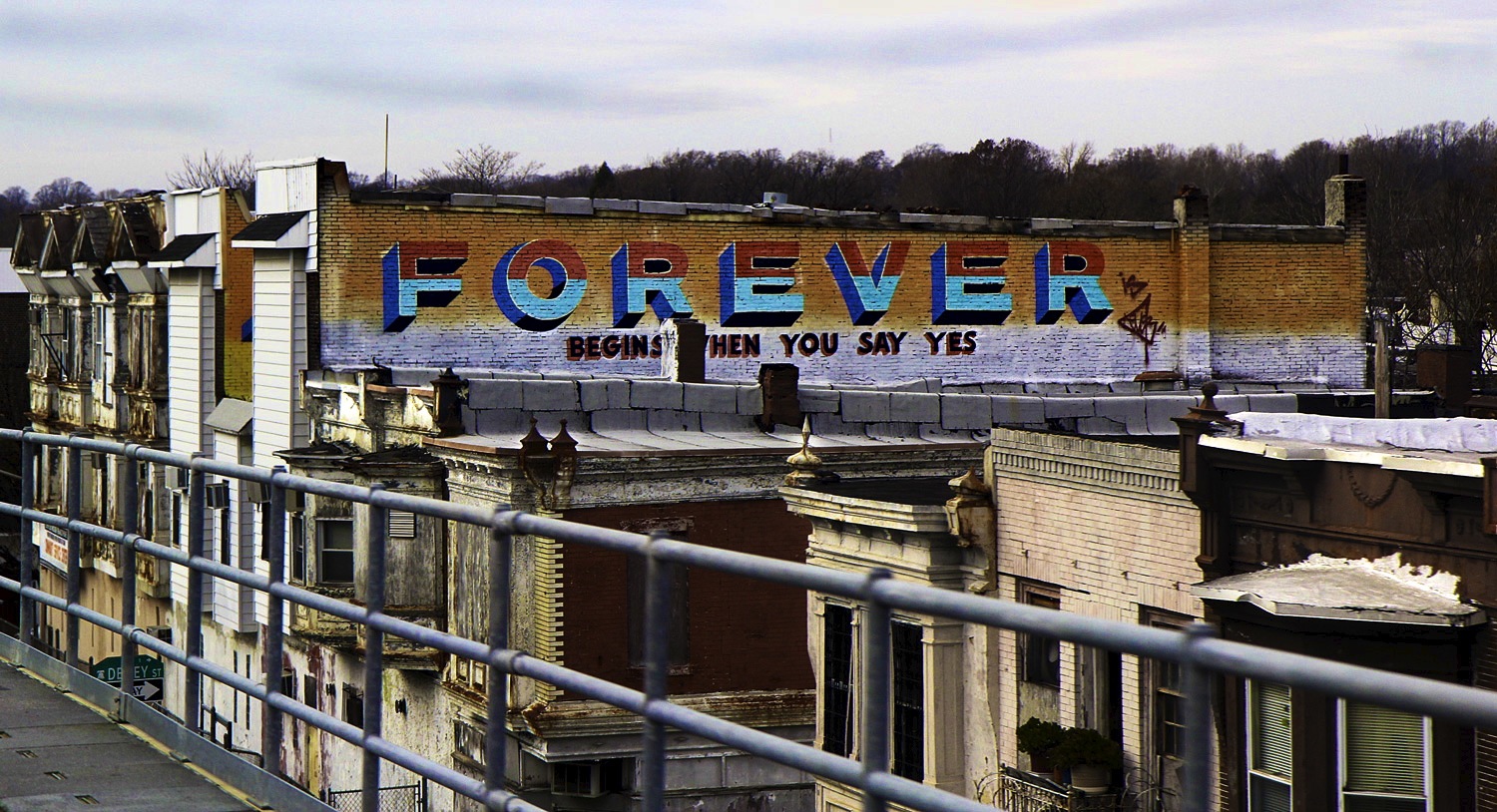 But probably better than a blank wall. See also here and here and here.
But probably better than a blank wall. See also here and here and here.
cityscape
mural
West Philly
Love Letter murals
elevated train
rooftops
(Image credit: JJ Stein)
Nov 22, 2013
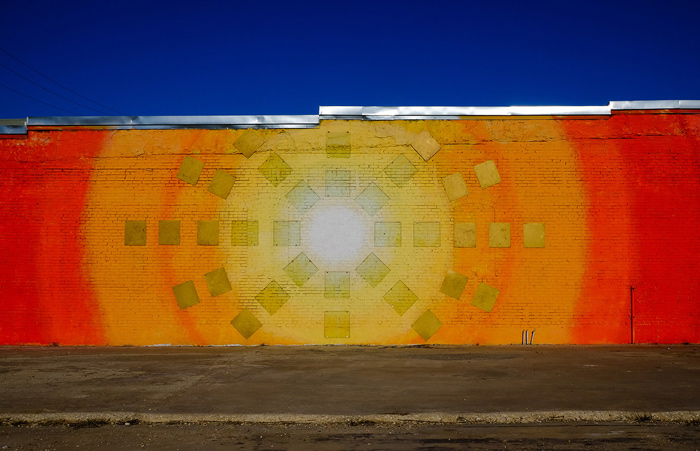 Since it's November 22, our picture today is from Dallas, Texas. But so far as we know–and we believe we know far enough–it shows us nothing that adds anything whatsoever to our understanding of what happened in Dallas back then. It's just kind of a nice wall.
Since it's November 22, our picture today is from Dallas, Texas. But so far as we know–and we believe we know far enough–it shows us nothing that adds anything whatsoever to our understanding of what happened in Dallas back then. It's just kind of a nice wall.
Texas
streetscape
mural
wall
JFK
Dallas
(Image credit: Jim Radcliffe)
Jan 8, 2014
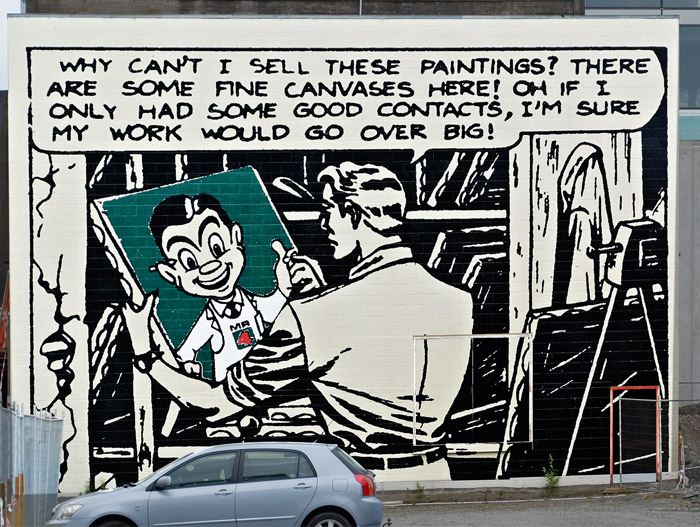 The little guy here in the white apron, with a pencil behind his ear–that's Mr. 4, the grocer-mascot of New Zealand's ubiquitous Four Square chain of supermarkets.
The little guy here in the white apron, with a pencil behind his ear–that's Mr. 4, the grocer-mascot of New Zealand's ubiquitous Four Square chain of supermarkets.
The mural featuring Mr. 4 covers a side wall of the art museum in Christchurch. The museum is closed at the moment and has been for a couple of years. All the artwork currently on exhibit is out in the streets of the city, like this piece.
Perhaps you are wondering why in the picture below there's a crane on top of the museum? Hold that thought; we'll get to it soon.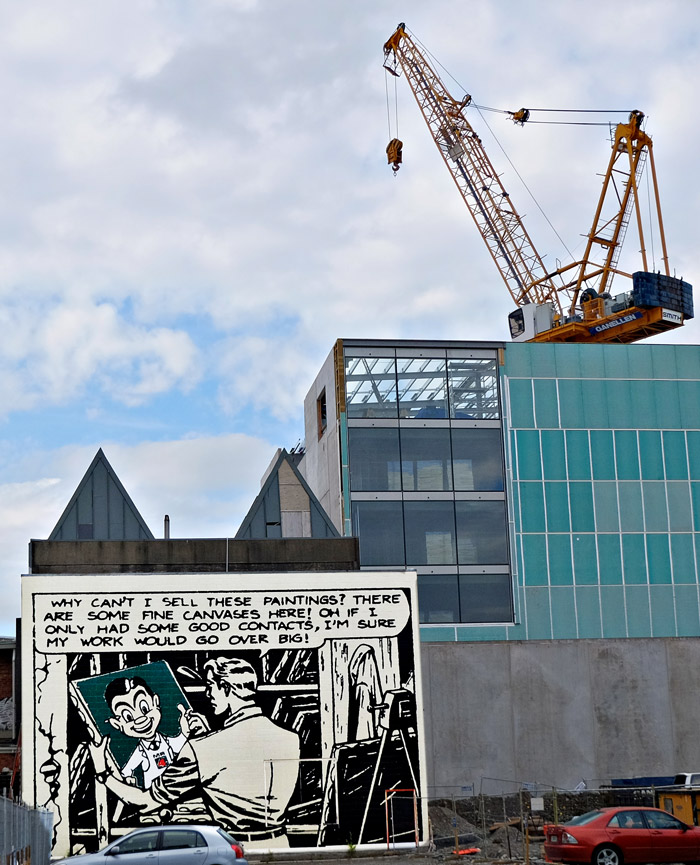
museum
New Zealand
art
streetscape
earthquake
mural
crane
grocery store
logo
Christchurch
(Image credit: Little Fuji)
Feb 28, 2014
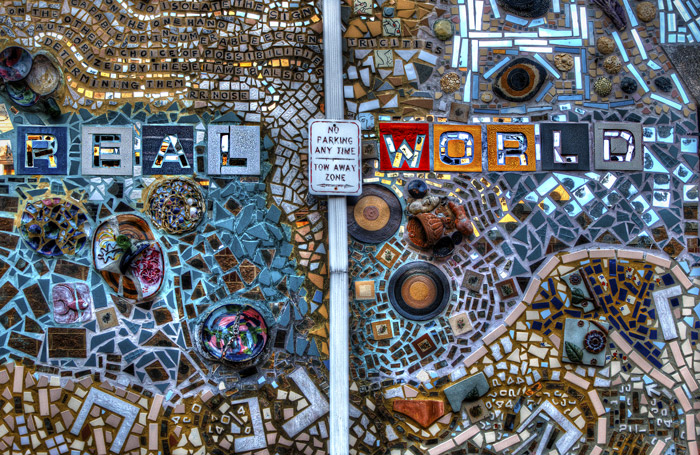 Isaiah Zagar's Magic Gardens in Philadelphia is a compound of galleries and courtyards devoted to Zagar's obsessive mosaicking of every square inch of everything.
Isaiah Zagar's Magic Gardens in Philadelphia is a compound of galleries and courtyards devoted to Zagar's obsessive mosaicking of every square inch of everything.
Here on the outer side of the wall surrounding the place, we see a sign on a drainpipe that clarifies what's important to life outside the magic garden
art
streetscape
mural
signage
mosaic
wall
Isaiah Zagar
(Image credit: Little Fuji)
Mar 20, 2014
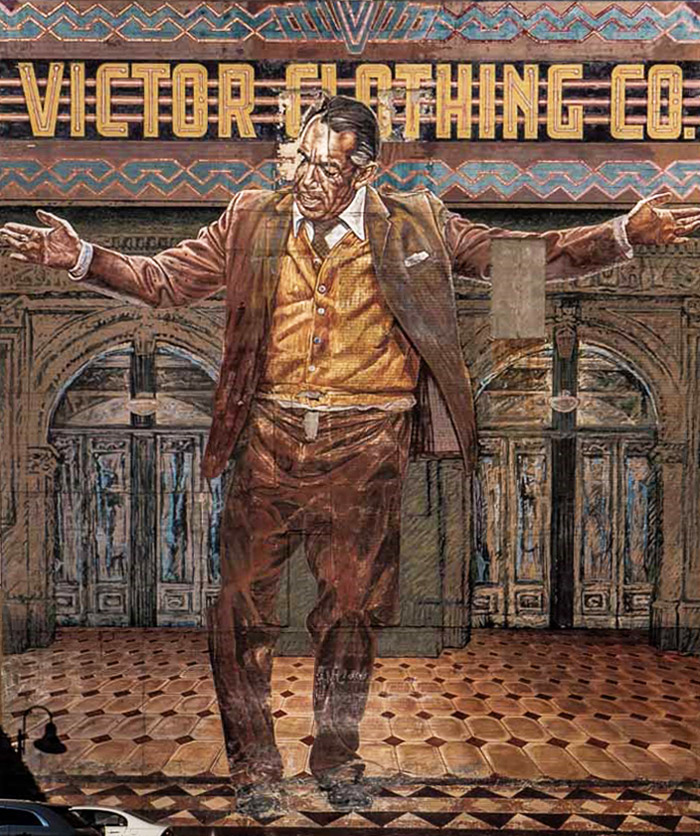 The late actor Anthony Quinn does his thing on the wall of Victor Clothing Company.
The late actor Anthony Quinn does his thing on the wall of Victor Clothing Company.
His thing, of course, was, and is here, and always will be that thing that Zorba did. But artist Eloy Torrez, who painted this mural in 1984, titled the work "The Pope of Broadway" because . . . because . . .
Well, Quinn did once play an exiled Russian bishop who became pope, in Shoes of the Fisherman. And the mural is located at 220 S. Broadway in Los Angeles. But really.
art
streetscape
California
mural
Los Angeles
Anthony Quinn
1984
Hollywood
Zorba the Greek
(Art by Eloy Torrez)
Dec 13, 2014
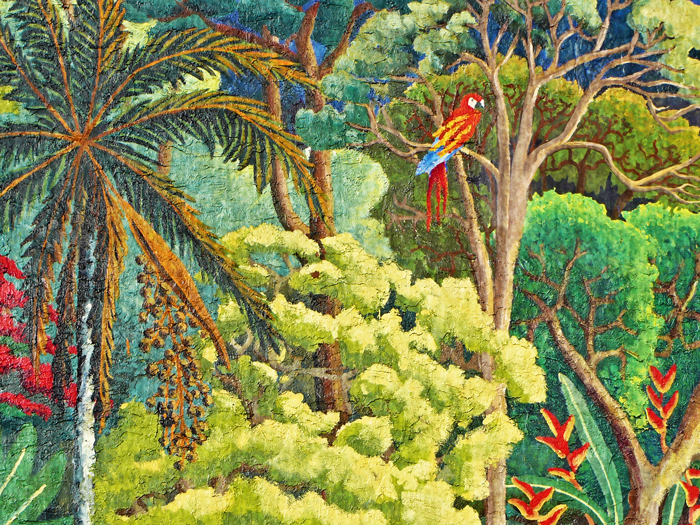 Detail from "Tropical Rainforest with Waterfall" by Ana Uribe (1999), a mural in the Kensington neighborhood of Philadelphia.
Detail from "Tropical Rainforest with Waterfall" by Ana Uribe (1999), a mural in the Kensington neighborhood of Philadelphia.
landscape
Philadelphia
mural
rainforest
Kensington
(Art by Ana Uribe)
Jan 30, 2015
 Caught by the camera just as he finishes up his unauthorized street decor, this graffiti artist in Queratoro, Mexico, appears to have done a pretty darn good job painting a quetzalcoatl, the feathered serpent of the ancient Aztecs.
Caught by the camera just as he finishes up his unauthorized street decor, this graffiti artist in Queratoro, Mexico, appears to have done a pretty darn good job painting a quetzalcoatl, the feathered serpent of the ancient Aztecs.
streetscape
Mexico
mural
graffiti
Queratoro
(Image credit: Hector Muñoz)



 One of the Love Murals on Market Street in West Philly.
One of the Love Murals on Market Street in West Philly.



 Who would win, the panda or the puppy?
Who would win, the panda or the puppy?








 The little guy here in the white apron, with a pencil behind his ear–that's Mr. 4, the grocer-mascot of New Zealand's ubiquitous Four Square chain of supermarkets.
The little guy here in the white apron, with a pencil behind his ear–that's Mr. 4, the grocer-mascot of New Zealand's ubiquitous Four Square chain of supermarkets.

 The late actor Anthony Quinn does his thing on the wall of Victor Clothing Company.
The late actor Anthony Quinn does his thing on the wall of Victor Clothing Company.
 Caught by the camera just as he finishes up his unauthorized street decor, this graffiti artist in Queratoro, Mexico, appears to have done a pretty darn good job painting a quetzalcoatl, the feathered serpent of the ancient Aztecs.
Caught by the camera just as he finishes up his unauthorized street decor, this graffiti artist in Queratoro, Mexico, appears to have done a pretty darn good job painting a quetzalcoatl, the feathered serpent of the ancient Aztecs.